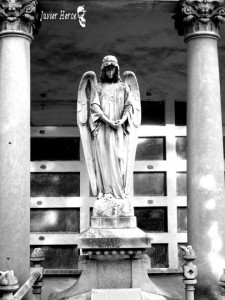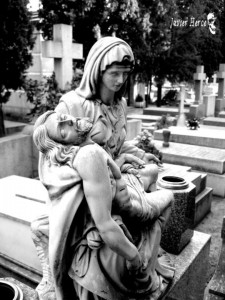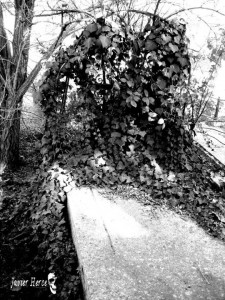Tradiciones españolas en el día de Todos los Santos, y la creencia en las Ánimas benditas. Posted by Magda on Nov 1, 2012 in Spanish Culture
El inicio del mes de Noviembre llega siempre a España como un homenaje en recuerdo a nuestros difuntos, y cargado de antiguas creencias, tradiciones y supersticiones.
 El día 1 de Noviembre es el Día de Todos los Santos, tradición que estableció la Iglesia Católica para compensar a todo santo o mártir que no tuviese un día propio de celebración en el santoral. En ese día es costumbre visitar los cementerios, adornar con flores las tumbas de nuestros seres queridos fallecidos, y por supuesto también hay un componente gastronómico propio. Las castañas tostadas y los boniatos asados son muy típicos en estos días, así como dulces y pasteles de todo tipo: gachas, huesos de santo, pestiños, carne de membrillo, etc. Dependiendo de la zona geográfica, se organizan reuniones familiares en casa, o bien se celebra en el campo, tras visitar el camposanto, y si el tiempo acompaña. También es muy típico encender “mariposas” en aceite, pequeñas velas que se dice ayudan a encontrar el camino a los muertos. Recuerdo que de pequeña, siempre pedía a mi madre que me dejase a mí encender esas luces que servían de guía a las ánimas.
El día 1 de Noviembre es el Día de Todos los Santos, tradición que estableció la Iglesia Católica para compensar a todo santo o mártir que no tuviese un día propio de celebración en el santoral. En ese día es costumbre visitar los cementerios, adornar con flores las tumbas de nuestros seres queridos fallecidos, y por supuesto también hay un componente gastronómico propio. Las castañas tostadas y los boniatos asados son muy típicos en estos días, así como dulces y pasteles de todo tipo: gachas, huesos de santo, pestiños, carne de membrillo, etc. Dependiendo de la zona geográfica, se organizan reuniones familiares en casa, o bien se celebra en el campo, tras visitar el camposanto, y si el tiempo acompaña. También es muy típico encender “mariposas” en aceite, pequeñas velas que se dice ayudan a encontrar el camino a los muertos. Recuerdo que de pequeña, siempre pedía a mi madre que me dejase a mí encender esas luces que servían de guía a las ánimas.
El día 2 de Noviembre celebramos el Día de los Fieles Difuntos, y es un día de oración por aquellos que no continúan su vida terrena, pero principalmente por las ánimas del purgatorio. Estas ánimas benditas, o ánimas del purgatorio son, según la doctrina cristiana, las almas de aquellos fieles que murieron sin haberse arrepentido completamente, o expiado sus pecados a través de la penitencia, y permanecen penando y sufriendo en el Purgatorio hasta que son purificados, y pueden entrar en el cielo. Algo así como el infierno temporal de los buenos, pues antes o después terminarán abandonándolo. Debido a ese sufrimiento, la iglesia recomienda rezar por su pronta salvación, recitando jaculatorias
Lo curioso, al menos para mi, es que no solo se reza por ellas, sino también para pedirles favores, algo que en ocasiones puede ser peligroso. Las ánimas benditas están muy presentes en nuestras tradiciones, leyendas y supersticiones. Cuentan las ancianas que aquellos que no rezan por su alma corren el riesgo de recibir su visita nocturna como aviso en forma de golpes o algún fenómeno extraño, más si se les ha pedido un favor, y el vivo no cumple con su parte del trato. Normalmente el pago por dichos favores consiste en encender una vela por ellas durante un tiempo determinado, o incluso de por vida. Así que yo, solo por si acaso, prefiero no pedirles nada no sea que me olvide de mi parte cuando me marche de vacaciones, y tengan que darme un fantasmal toque de atención…
The beginning of November always comes to Spain with an homage in memory of our dead, and full of ancient beliefs, traditions and superstitions.
November 1st is the Day of All Saints, a tradition that established the Catholic Church to compensate every saint or martyr who did not have their own day of celebration in the calendar. On this day it is a custom to visit the graveyards, to decorate with flowers the tombs of our loved ones who have died, and obviously there is a gastronomic part too. Roasted chestnuts and sweet potatoes are very typical in these days, as well as sweets and pastry of all kind: oatmeal porridge, saint’s bones, pestiños (a honey-coated sweet fritter), quince jelly, etc. Depending on the geographical area, familiar meetings are done at houses, or it is celebrated in the open field, after visiting the churchyard, and if the weather helps. It is also very typical to light “butterflies” in oil, small candles that are said to help dead to find their way. I remember that when I was a little girl, I always asked my mum to let me light these candles which where a guide to the souls.
On November 2nd we celebrated the Day of the Dead, and it is a day of prayer for those who don’t continue their earthly life, but mainly for the souls of the purgatory. These blessed souls, or souls of the purgatory are, according to the Christian doctrine, the souls of the faithful who died without having completely regretted, or expiated their sins by penance, and continue suffering in the Purgatory until they are purified, and they can go to heaven. It is as a temporary hell for the goodies, because they will leave it sooner or later. Due to this suffering, the Church recommends us to pray for their prompt salvation, reciting fervent prayers.
The funny thing, at least for me, is that we not only pray for them, but we also pray to ask them for favors, something that in some occasions can be dangerous. The blessed souls are very present in our traditions, legends and superstitions. The old women say that those who don’t pray for their souls run the risk of receiving their night visit as warning in the form of knocks or strange phenomenon, especially if a favour has been asked, and the living one doesn’t carry out his part of the deal. Usually the payment for the above mentioned favors consists of lightning a candle for them during a certain time, or even during a whole life. Just in case, I prefer not asking them for anything so that I forget my part when I go on vacations, and they have to give me a ghostly warning…

Build vocabulary, practice pronunciation, and more with Transparent Language Online. Available anytime, anywhere, on any device.






Comments:
Mohammed:
Hi,
Through your article or post, can you differentiate about Islamic culture and festival culture in Spain.
Regds
Muhammed.
Magda:
@Mohammed I´ll try to look for some Mohammed.